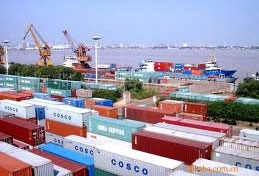Export companies with backs against wall
 |
| illustration photo |
The government issued Resolution 11/NQ-CP dated March 1, 2011 presenting measures to stabilise the macroeconomy and bridle inflation on the back of economic vulnerabilities.
Alongside credit tightening policies, the government urged banks to prioritise lending to production and export areas.
Responsive to the call, from early March until present banks put forward lots of incentive policies to back corporate clients. For instances, Eximbank and Techcombank presented supportive export lending programme, Sacombank offered preferred lending rates to seafood and coffee exporters or VIB introduced policies on capital and lending rate support to rice and seafood exporters.
However, businesses said they could not access such preferred policies.
Deputy general director of Minh Phu Group Chu Van An said only a handful of seafood exporters got access to preferred lending rates.
In fact, seafood processing businesses currently bear lending rates of around 22-23 per cent, per year. An estimated that with such high lending rates, seafood exporters would incur big losses because export seafood price only hikes 10 per cent, while input costs surge 40 per cent compared to early year.
A Hanoi textile garment firm representative said the firm recently did not sign a $100 million export contract with a partner due to capital distress.
“Bank lending rates are around 23 per cent per year. Sourcing US dollar loans are not a viable option,” he said.
Most small- to medium-sized business sourcing loans for production and exports face lending rates ranging from 22 to 24 per cent per year, nearly triple the corresponding period in 2010, according to a banking source.
“Since preferred loans are limited, the bank has to sort out export businesses with good records and long-lasting relations with the banks or those having collateral to lend,” said a Techcombank representative.
In fact, only around 20 per cent of small firms could access banks’ preferred loans, said Vietnam Small and Medium Size Enterprises Association chairman Cao Sy Kiem.
Director of Toan Thang Company Thai Dinh Toan said the firm had to temporarily lay off nearly half of its workers.
“Current time is tough for us. Lending rates are overly high while profit margins from making handicrafts remain modest,” Toan said.
What the stars mean:
★ Poor ★ ★ Promising ★★★ Good ★★★★ Very good ★★★★★ Exceptional
Related Contents
Latest News
More News
- Foreign fruits flood Vietnamese market (December 09, 2025 | 13:22)
- Vietnam’s fruit and vegetable exports reach $7.8 billion in first 11 months (December 05, 2025 | 13:50)
- Vietnam shapes next-generation carbon market (November 26, 2025 | 15:33)
- PM urges Ho Chi Minh City to innovate and remain Vietnam’s economic locomotive (November 26, 2025 | 15:29)
- Experts chart Vietnam's digital finance path: high hopes, high stakes (November 14, 2025 | 10:56)
- Vietnam’s seafood imports surge 30 per cent in first 10 months (November 10, 2025 | 19:35)
- Vietnam’s durian exports hit $1 billion milestone (October 30, 2025 | 17:41)
- Beyond borders: Sunhouse and new era of Vietnamese brands on Amazon (October 28, 2025 | 10:46)
- Record-breaking trade fair set to open in Hanoi (October 15, 2025 | 15:59)
- Timber sector seeks solutions to VAT refunds (October 14, 2025 | 18:58)

 Tag:
Tag:




















 Mobile Version
Mobile Version